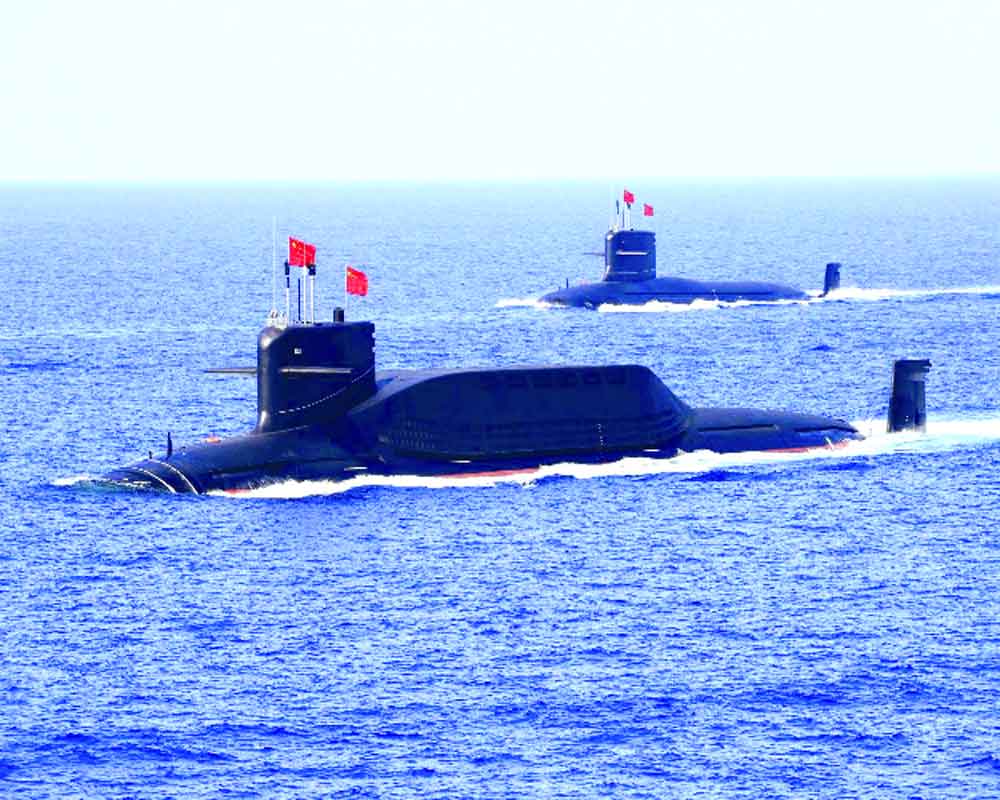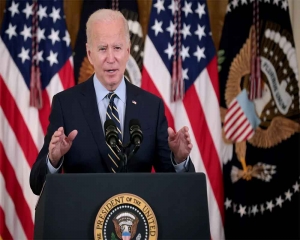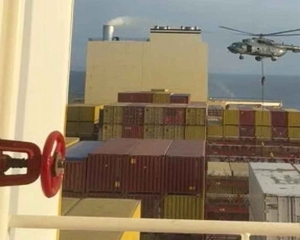The AUKUS is a new war game. It is not just about making nuclear submarines in Australia. A New Cold War is coming up. It has already started. The Canberra-London-Washington Axis could be a new starter. It could harbinger a new game of power to the Asia-Pacific
The AUKUS (Australia, the United Kingdom and the United States of America) pact is a new attempt to prevent China’s rapid aggression and expansion across the Indo-Pacific (earlier known as Asia-Pacific). The alliance is bringing the former colonial master i. e. the UK with its two colonial cousins together. This pact offers Australia an opportunity to counter China’s growing naval aggression in the region.
For America, it demonstrates its full commitment to secure a peaceful Indo-Pacific on the background of an ever-asserting China in the Asia-Pacific. And for the UK, its participation in the AUKUS would certainly enhance its global position after a devastating Brexit from the European Union.
The AUKUS pact was signed on September 15, 2021. This allows Australia to build nuclear-powered submarines by using advanced technology provided by the US. The remarkable aspect of the alliance is the involvement of the UK in the Indo-Pacific. Once a global naval giant, probably, the UK also wants to reclaim its ground in the region and to be a part of the regional power dynamics.
Is it good for Australia to choose America over China? Absolutely yes. May be China and Australia have been longstanding trade partners, but the way the former is expanding and trying to impose its diktats might pose a potential threat to the latter. Siding with the US is not a new pattern of security alliance. The US has been the only dominant power in the Indo-Pacific for decades now. With the US, Australia could be reassured with a sense of renewed security and tranquility in the region. Is Australia trying to create a security umbrella around? It seems so. Though it is not going nuclear at the moment, in future, it may decide to do so.
China’s growing expansionism is causing serious concern for almost over a decade or so. A quick review of Chinese actions makes such patterns easy to discern. After Mao Zedong, it is Xi Jinping who has really claimed the status of a paramount leader in the true Chinese sense of the term. After taking over power from Hu Jintao in 2012, Xi has come up with a new China Dream to strengthen the Chinese Communist Party (CCP) and the leadership of the country.
Can China be trusted? Looking at its overtures in trade, politics and diplomacy, one would certainly say that Beijing is not at all trustworthy. Its opaque and deceptive nature of functioning is to be observed carefully. Xi’s designs have no bounds. No one, except a cohort of his close communists, knows how, when and where Beijing will move next. In fact, this is how a closed political system like that of China operates.
Today the unprecedented shared global challenges that are encountered by all are terrorism, climate change, massive income inequality and a rising trend of authoritarianism. Clearly, conventional wisdom says that such challenges are not solved by only a single nation. They demand active cooperation among the various nations. It could be a big mistake if we all accept the Sino-US relationship solely as a zero-sum military struggle and trade war. At this moment, what is urgent is an increasing sense of close cooperation from international organisations and powerful nations to address the common challenges faced by the planet.
The Quad (US, Japan, Australia and India), the AUKUS and the emerging cooperation in the Indo-Pacific particularly against China could simply trigger a larger conflict in the zone. As America is fast withdrawing from its traditional war theatres like Afghanistan, Iraq and Syria (probably), it clearly indicates that Washington is planning to gear up and consolidate its strength in the Indo-Pacific region. In reality, this is the most dynamic of all international navigational routes around the world. And it used to be America’s traditional home ground with decades old allies like Japan, South Korea and now, of course India and Australia.
Meanwhile the Chinese military experts say the AUKUS could make Australia a target of nuclear war if such a war breaks out in the region. It is highlighted by China’s Global Times that Washington won’t arm Australia with nuclear weapons, but the fact is that it is easy for the US to equip Australia with nuclear weapons and submarine-based ballistic missiles when Australia has the submarines.
Many global security experts say Washington’s AUKUS initiative has the overtones of the Cold War of the yesteryears. And it resembles the historic Five Eyes Alliance (FVEY) signed in the year March 5, 1946, an intelligence sharing partnership. The FVEY was formally founded in the aftermath of the Second World War through the multilateral agreement for active cooperation in signals intelligence (SIGINT) formally known as UKUSA Agreement.
Thus, the FVEY has been regarded as the world’s most significant intelligence sharing agreement so far. However, originally it was an agreement between the UK and the USA only but later it was expanded to include Canada in the year 1948 and Australia and New Zealand in 1956. Hence the FVEY being one of the most secretive treaties of the World War-II has encompassed the Anglosphere countries and helped them to share rare information.
Interestingly, this post-war intelligence sharing partnership has enabled these countries to create an infrastructure of surveillance for more than 75 years now. To everyone’s surprise, only a decade ago in the year 2010, the full text of the UKUSA deal was released by the Governments of both the UK and the US. And, it was officially recognised!
At a time of heightened global security tensions, the AUKUS might have hidden motives. It may certainly turn into a robust military alliance like that of the North Atlantic Treaty Organization (NATO) to counter solely the People’s Republic of China (PRC) in the days to come. It could gradually turn out to be the NATO of the Indo-Pacific.
Is China scared of the AUKUS? Yes it is. It is highly worried about the alliance among the three colonial powers. The indications are that the Communist country has just started releasing worrying statements from its various official agencies and concerned ministries. Only the informal partnership has been formed with no real military drills and about 18 nuclear submarines are supposed to be delivered to Australia only by late 2030s.
And this new fleet would replace Australia’s squadron of six aging diesel-powered submarines. Meanwhile, Australia has derailed an agreement with France worth nearly USD 60 billion to purchase and build submarines. And it has led to a great deal of misunderstanding between the two countries in the context of signing the AUKUS followed by a deal to get nuclear submarines from the US or the UK. However, the damage repairing exercises are already on at various levels so as to convince Paris about the urgency of the current pact between the three nations in the Indo-Pacific.
Beijing has increasingly become suspicious. If Xi is such a powerful leader (already he has become a life-time President), why he is wary about such moves by the new alliance? China’s global alliances, new grand plans under the Belt and Road Initiative and constant muscle flexing should not make Beijing nervous at the moment. China’s growing greed, arrogance and the very miscalculation of the military might of the global powers might herald disaster to the Middle Kingdom. Xi must understand the fact that China is an Asian power. The rise of an Asian nation to the status of global superpower only to replace the US is not acceptable to the Western nations. In the name maintaining the global liberal order, the US has been dominating the world since the end of the Second World War. But then, it is a democratic world power wherein one can initiate a dialogue and can pursue a peaceful course of action.
Therefore, despite creating excesses in Hiroshima and Nagasaki, Vietnam, Iraq, Afghanistan, and in many other parts of the globe, people feel comfortable and safe under the leadership of Western nations such as the US.
On the other hand, China’s long journey to the institutions of global governance is led by an authoritarian system. And the Communist system is purely opaque, devoid of all respect to universal values of human rights and basic freedoms. Sadly, China’s system has no takers even in its immediate neighborhood. Beijing is creating more enemies than winning friends in its surroundings.
Today countries like India, Japan, the Philippines, South Korea, etc, are worried about Beijing’s growing aggression. So, Xi must look back. Instead of challenging the Western nations, it should rise peacefully by offering due respect to neighbours and universal democratic rights. In a nutshell, China must learn to become a rule-abiding nation in the international sphere. Then China’s rise would face a few questions and create little headaches for the rest of the world.
The AUKUS is a new war game. It is not just about making nuclear submarines in Australia. A New Cold War is coming up. It has already started. The Canberra-London-Washington Axis (CLWA) could be a new starter. It could harbinger a new game of power to the Asia-Pacific. And finally, the CLWA could escalate a nuclear tipping point in the Indo-Pacific. All the three global powers are on a dangerous pathway.
(Dr Makhan Saikia has taught political science and international relations for over a decade in institutions of national and international repute after specialisation in globalisation and governance from Tata Institute of Social Sciences, Mumbai. He is the chief editor of the Journal of Global Studies, an international research journal)


























